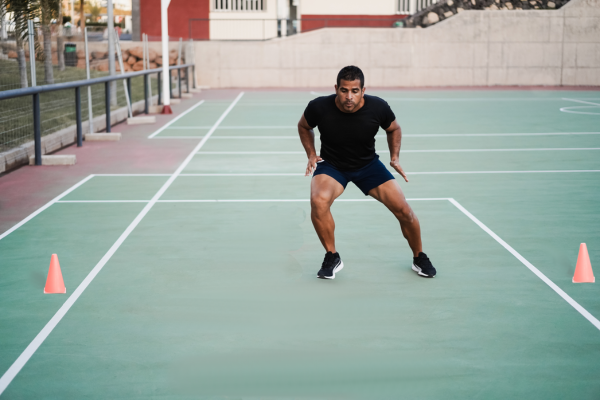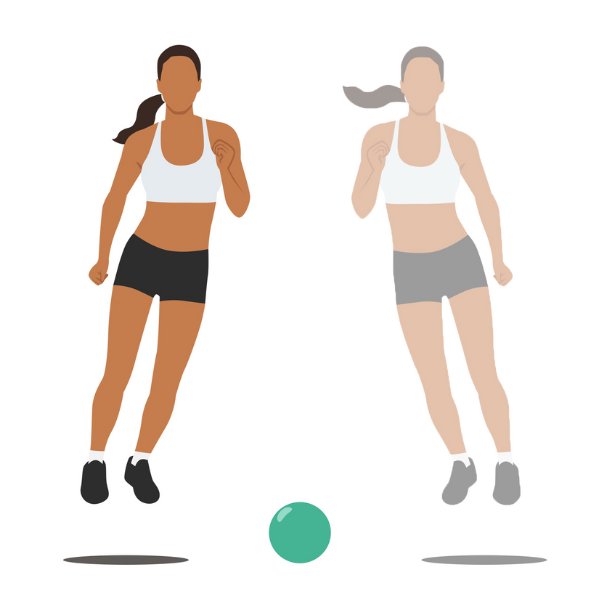Nutrition
Lateral Quickness: What It Is and Find out how to Enhance It
“Lateral quickness” seems like a talent that’s unique to skilled athletes. In any case, most of us mere mortals are simply making an attempt to steadiness a wholesome mixture of cardio, power coaching, and mobility work. Who has the time for specialised coaching?
However, athlete or not, lateral quickness is related to your potential to maneuver effectively, and it’s not all that tough or time-consuming to include lateral quickness workouts into your present routine.
Plus, isn’t it form of enjoyable to work out like a professional?
What Is Lateral Quickness?
Lateral quickness is the flexibility to maneuver your physique back and forth rapidly. It’s much less about velocity — accelerating in a single course — and extra about with the ability to transfer left to proper and quickly change instructions whereas sustaining steadiness and management of your physique.
Why Is Lateral Quickness Vital?
It improves sports activities efficiency
Relying on the game, lateral quickness can imply the distinction between a win or a loss.
“Many sports activities require athletes to alter course rapidly in a side-to-side method. This could possibly be a shortstop fielding a floor ball hit up the center, a working again avoiding a linebacker who’s making an attempt to make a sort out, or a tennis participant shifting to the alternative sideline to return a shot,” explains Dr. Jordan Duncan, DC, proprietor of Silverdale Sport & Backbone in Silverdale, Washington.
It’s an often-neglected motion sample
Past the courtroom or taking part in area, lateral quickness may also have an effect on how you progress in your on a regular basis life.
“You don’t should play a sport. Avoiding somebody on a sidewalk, navigating a busy concourse on the airport — we want to have the ability to have that potential to step to the facet to get out of the way in which,” says Pete McCall, C.S.C.S., grasp coach and host of the All About Health podcast.
But, side-to-side motion is usually absent from a typical health routine. Frequent bodily actions like working, biking, rowing, and even biceps curls all happen alongside the sagittal airplane (shifting the physique in a ahead and backward movement). This coaching deficit could make us weak, explains Duncan.
“We are sometimes injured in areas the place we lack power, coordination, and mobility,” he says. “Many people are in a position to stroll and run fairly nicely however battle when shifting side-to-side. Coaching with actions within the lateral airplane, even progressing to fast actions, may be helpful for muscle and joint well being, in addition to total conditioning.”
5 Workout routines to Enhance Lateral Quickness
To enhance lateral quickness, you could prepare in a side-to-side motion sample. Each Duncan and McCall advocate a mix of velocity drills and plyometric coaching.
“By doing this, you’ll strengthen sort II (fast-twitch) muscle fibers and improve the effectivity of the nervous system,” Duncan says. “This may result in higher velocity and drive of decrease extremity muscle contraction, leading to improved lateral quickness.”
Lateral quickness isn’t the one profit to doing these actions. Incorporating velocity drills into your routine is a superb strategy to shake up your cardio exercises, and workouts like skater jumps and banded lateral walks will strengthen the muscular tissues of the glutes, hips, and legs.
1. Lateral shuffle

- Arrange a pair of cones 5 to 10 yards aside. Alternatively, choose mounted markers, like phone poles or lamp posts.
- Stand contained in the left cone along with your toes hip-width aside, your elbows bent, and palms in entrance of your chest.
- Holding your again flat and abs engaged, bend your knees, push your hips again, and decrease your physique right into a quarter-squat.
- Holding your chest lifted, rapidly step your proper foot to the best, push off with the left foot, after which return to your authentic stance (toes hip-width aside). Repeat the motion, shuffling to the best till you attain the opposite cone.
- Instantly reverse the motion and shuffle again to the primary cone.
2. Lateral band stroll
- Loop a small resistance band round your legs simply above your ankles or knees and stand along with your toes about shoulder-width aside, creating stress on the band.
- Holding your again flat and abs engaged, bend your knees, push your hips again, and decrease your physique right into a quarter-squat, shifting your weight towards your heels.
- Preserve the squat and stress on the band as you step your proper foot to the best, adopted by the left foot.
- Proceed to sidestep to the best for the desired variety of steps, then reverse the motion and return to the beginning place.
3. Aspect soar over mini hurdle

- Along with your toes collectively, stand subsequent to a mini hurdle or an object of comparable measurement.
- Soar sideways over the hurdle, then instantly soar again to the beginning place.
- Proceed to leap backwards and forwards over the hurdle, spending as little time on the bottom as doable.
4. Skater soar
- From a standing place, shift your weight onto your left leg, bending your left knee to decrease your hips a couple of inches whereas elevating your proper foot off the bottom.
- Sure to your proper by pushing off along with your left leg.
- Land softly in your proper leg, permitting your left leg to cross behind you and your arms to swing throughout your physique in the identical course.
- Pause, after which repeat the motion, this time pushing off along with your proper leg and touchdown in your left leg.
- Proceed leaping backwards and forwards.
5. Leaping rope, skier variation
- Maintain the rope along with your elbows bent, palms going through up, and wrists roughly at waist top. Your wrists needs to be a couple of inches away from the edges of your physique.
- Begin with the rope behind your heels, and spin the rope up and over your head. (When you’ve constructed up momentum, it’s best to be capable of proceed spinning the rope by shifting your wrists with minimal elbow and shoulder motion.)
- Maintain a slight bend in your knees, keep in your toes, and soar a few inches off the bottom and to the best. On the subsequent swing, soar to the left. Proceed alternating sides with every soar.

